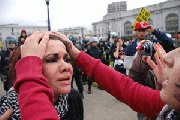SAN FRANCISCO — Arab American community groups are calling for accountability and cooperation from law enforcement after some activists suffered injuries during scuffles with police at an anti-war protest here in March.

|
|
San Francisco activists scuffle with police during a March protest. PHOTOS: Ramsey El-Qare |
Participants presented testimony about accusations of police brutality and bigotry toward Arab American protestors, who were marking the sixth anniversary of the start of the Iraq War and speaking out against occupation in the Palestinian territories.
Nadeen Elshorafa of AROC, who was a security representative at the demonstration, said trouble began when an Arab youth alerted her that another Arab youth was being harassed by the police.
“He was 12 years old and was being accused of throwing rocks,” she said.

|
|
Demonstrators react after a chaotic struggle with police during a March 21 San Francisco protest against the Iraq War and occupaiton in the Palestinian territories. |
“The next thing you know, we were being attacked,” she said.
Lily Haskell, an AROC organizer of Moroccan descent, said police “rushed at the crowds with barricades and batons.”
Haskell and Elshorafa, who were then immediately arrested, felt the police officers did not follow protocol.
“I’ve been to protests before,” said Haskell. “Usually police will give 3 warnings. It’s their job to ensure the safety of protesters,” she said.
But Captain John Goldberg, who oversees San Francisco Police Department operations, addressed SFPD general procedures and protocol at the June 15 hearing, asserting that the police force is “extraordinarily diverse.” He said police respect San Francisco’s diversity.
Goldberg left the hearing after his presentation and did not hear the protesters’ testimonies.
He later said in a separate interview that he was not at the protest and was initially unaware of what occurred between the SFPD and the protestors. When he learned of the allegations, he said such a situation would be of “great concern.”

|
|
Police and anti-war and occupation demonstrators clash during a March 21 protest in San Francisco. |
The protestors believe the attacks were racially motivated.
“It would have definitely been different if it was a young white kid in question,” Elshorafa said.
According to Elshorafa, four young Arab men were later arrested that afternoon and charged, but not convicted, with terrorist enhancements and suspicion of promoting terror.
“These were bogus charges,” she said.
She said the charges against Elshorafa, Haskell, and the four men were later dropped for lack of evidence.
In addition to the arrests, Haskell said several Arab protesters suffered various injuries, and two youth were rushed to a nearby emergency room.
Some at the hearing said they were knocked down by police and kicked in the stomach and ribs.
Non-Arab organizers and activists at the hearing also said the incidents were “racially unjust.”
“Police treatment is extremely different with privileged communities,” said Brooke Lober, of the International Jewish Anti-Zionist Network.
Guillermina Castellanos, of Colectiva de Mujeres, said what happened to the Arab protesters was “just not right.”
“It was hate abuse and a violation of San Francisco’s sanctuary city ordinance,” she said.
San Francisco supervisors Ross Mirkarimi and David Campos, who organized the hearing and have been working with AROC and the Arab community to address the situation, said they were both concerned and plan to move forward with follow up meetings.
“We need to ensure that something like this doesn’t happen again,” said Campos.
While AROC members and other Arab American community groups that attended the hearing were pleased with the progress made, several said it was only the beginning.
“This is a tool we need to use to empower our community and continue to work with City Hall,” said Rama Kased, co-founder of the Arab Youth Organization.”
Organizers said that while there is no current investigation of the events because no official complaints have yet been filed against the SFPD, next steps could include more meetings with officials and demands of policy reviews and cultural competency training for police.
Elshorafa said that until the next steps materialize, Arab communities in San Francisco and throughout the U.S. should still feel encouraged.
“The point of this hearing was to put the police in check,” said Elshorofa. “These things do happen, but we have a right to be out there. Don’t let the fear keep you at home.
“We need to educate ourselves and others, and most importantly, we need to organize and mobilize with other communities facing similar forms of oppression and struggle. If there’s no consciousness of joint struggle, no change will occur.”






Leave a Reply